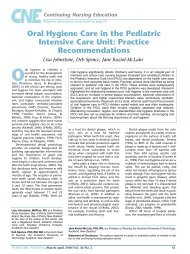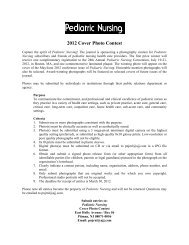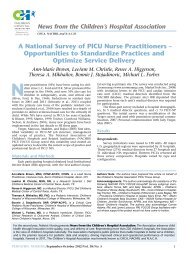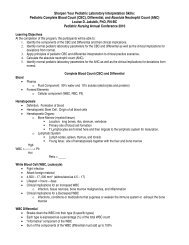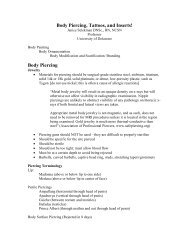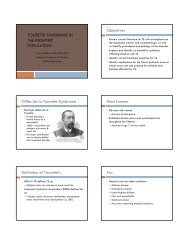2 Column Dept - Pediatric Nursing
2 Column Dept - Pediatric Nursing
2 Column Dept - Pediatric Nursing
You also want an ePaper? Increase the reach of your titles
YUMPU automatically turns print PDFs into web optimized ePapers that Google loves.
<strong>Pediatric</strong> Ethics, Issues, & Commentary<br />
gories of obese children, depending upon the presence of<br />
co-morbidities that predict serious harm and whether these<br />
are reversible in adulthood, or whether these constitute<br />
imminent harm in childhood. State intervention would be<br />
justified when the co-morbid conditions predict serious<br />
harm and are not reversible in adulthood, as well as when<br />
the co-morbid conditions constitute serious harm in childhood<br />
(Varness et al., 2009).<br />
Citing concerns for bias and conjecture in reaching a<br />
decision about obesity as child abuse, Mitgang (2011)<br />
underscored the importance of objective, physical evidence<br />
in an abuse analysis. She would justify state intervention<br />
when necessary to prevent loss of life or to address a current<br />
risk of serious harm and only after home-interventions had<br />
failed (Mitgang, 2011). Mitgang (2011) identified four factors<br />
that should be used by a court in determining whether<br />
actual medical harm caused by the child’s obesity warrants<br />
state intervention:<br />
• The severity of child’s illness associated with obesity.<br />
• The degree in which medical treatment can mitigate<br />
the resulting health effects.<br />
• The child’s complete physical and mental health picture.<br />
• When the just answer is unclear, the child’s risk of<br />
remaining obese as an adult.<br />
Response to Murtagh and Ludwig<br />
As one would expect, Murtagh and Ludwig’s (2011)<br />
article was met with a strong response from the medical<br />
and legal communities. Each of these three letters to the<br />
editor, including Ludwig and Murtagh’s response, will be<br />
discussed in turn.<br />
Ms. Carol Erskine, a justice in a Massachusetts county<br />
juvenile court, wrote to underscore that in these cases, state<br />
intervention may occur only under clearly defined legal<br />
parameters (Erskine, 2011). The state has to meet the burden<br />
of proof required to disrupt the privacy rights of the<br />
family; the mere suggestion of state intervention does not<br />
change the state’s actual burden (Erskine, 2011). Ludwig<br />
and Murtagh (2011) agreed with Ms. Erskine in their<br />
response to her letter and indicated their intent was to work<br />
within the existing legal structure, not to change it.<br />
Robert Siegel (staff physician for the Northern<br />
Kentucky Children’s Advocacy Center) and Thomas Inge<br />
(director of the Surgical Weight Loss Program for Teens &<br />
Center for Bariatric Research) took issue with Murtagh and<br />
Ludwig’s (2011) suggestion, stating that it might be unethical<br />
for an obese child to undergo bariatric surgery without<br />
first considering foster care (Siegel & Inge, 2011). For these<br />
physicians, weight-loss surgery and social service intervention<br />
are mutually exclusive (Siegel & Inge, 2011). Suitable<br />
candidates for this surgery would not be appropriate candidates<br />
for state intervention, and children under consideration<br />
for social service referral would not be appropriate candidates<br />
for surgery (Siegel & Inge, 2011). They explained<br />
that any family that met the Varness et al. (2009) criteria for<br />
state intervention would not meet the best-practice criteria<br />
for weight-loss surgery (Siegel & Inge, 2011). They also cited<br />
evidence that foster care may, in fact, be an obesogenic<br />
environment (Siegel & Inge, 2011). Ludwig and Murtagh<br />
(2011) responded to this criticism by noting that there are<br />
children who fall in between these categories, where they<br />
experience inadequate parenting that does not meet the<br />
legal definition of neglect.<br />
2<br />
Finally, Drs. Susan Yanovski, Jack Yanovski, and Mary<br />
Horlick (2011) noted that Murtagh and Ludwig’s (2011)<br />
article held two false assumptions: 1) severe childhood obesity<br />
necessarily resulted from poor parenting rather than<br />
genetics, and 2) type 2 diabetes requires removal from the<br />
home, and foster care is beneficial to obesity treatment.<br />
These authors argued that there is no evidence that foster<br />
families control the weight of obese children better than<br />
the children’s families of origin, and that greater social<br />
resources should be provided to parents of obese children<br />
so that medical complications can be prevented or treated<br />
within their own homes (Yanovski, Yanovski, & Horlick,<br />
2011). Ludwig and Murtagh (2011) responded that they<br />
recognized genes affect weight and that foster care would<br />
not be appropriate for most severely obese children, noting<br />
that the primary treatment for type 2 diabetes is lifestyle<br />
modifications and weight loss. While they agreed the foster<br />
care program should receive greater scrutiny, they also<br />
noted one case where a young teenager died while waiting<br />
for custody hearing (Ludwig & Murtagh, 2011). Finally,<br />
Ludwig and Murtagh (2011) agreed that greater resources<br />
should be provided but raised the practical question of who<br />
would actually provide those resources. They conclude that<br />
in the interim, existing resources that would preclude the<br />
need for foster care or bariatric surgery should be used<br />
(Ludwig & Murtagh, 2011).<br />
Additional Reasons Against Prosecution<br />
Other reasons to oppose the removal of obese children<br />
from their homes stem from a broad range of concerns.<br />
These include 1) severe emotional or psychological harm to<br />
the child, especially in light of the lack of evidence that foster<br />
care for these children is effective “treatment;” 2) inconsistencies<br />
in the legal process that might lead to unfair outcomes;<br />
and 3) a social and political landscape that arguably<br />
has a net effect of promoting childhood obesity.<br />
Lack of Evidence about Foster Care<br />
And Potential for Harm<br />
A more compelling argument against prosecution of<br />
parents is the most glaring: the lack of evidence regarding<br />
the effectiveness of protective custody or foster care<br />
(Diekema, 2011; Siegel & Inge, 2011; Yanovski et al., 2011).<br />
Diekema (2011), a pediatrician and ethicist, argued that<br />
without any evidence of its effectiveness, removing a child<br />
from her or his home should not be a mechanism used to<br />
treat childhood obesity. As a correlating factor, Diekema<br />
(2011) called attention to the significant psychological<br />
harm experienced by a child when removed from the<br />
home, and noted that this must be considered in any protective<br />
custody decision. This is compounded by a concern<br />
that some foster homes may not offer a nurturing environment.<br />
It is interesting to note that even those who support<br />
state intervention have cited concerns about the quality of<br />
foster care (Murtagh & Ludwig, 2011). Without evidence<br />
that the potential benefit of removing an obese child from<br />
her or his home outweighs the harm of doing so, the disruption<br />
of a family relationship cannot be justified<br />
(Diekema, 2011).<br />
Electronic Use Only<br />
Do No Reprint<br />
Potential for Unfair/Disparate Impact<br />
Another concern is the very real possibility that the<br />
interpretation of criteria to remove children from families<br />
may vary between different communities and jurisdictions



